A new form of soccer is kicking off in Louisville
December 5, 2018
Around 20 people assemble in a small gym on a rainy Saturday afternoon. There are about six teenagers sitting in motorized wheelchairs around the gym with plastic boards and various tools scattered all over the floor.
A few people are attempting to attach three boards to a girl’s wheelchair. Two of the boards attach to the bars that hold the foot rests of the chair and a third attaches to the other boards in front of the girl’s feet.
In the center of the gym, two people zoom around at dizzying speeds. They are using the front of the rack, formally called a guard, the sides of the guard and even the backs of their chairs to hit a 13-inch ball back and forth to each other.
Once all of the players have their guards attached to their chairs, a woman raises her hand and calls for everyone to come to the center circle of the gym. They all come in, and the woman, Patricia Rudd, founder of Kentuckiana Power Soccer (KPS) introduces herself. She describes the sport, power soccer, and how it is played.
The rules
Power soccer is a modified form of soccer for people who are physically disabled and confined to a powerchair. The rules are different than typical soccer, but the idea is the same: two teams and two goals. The players aim to score as many goals against the other team as they can.
The main difference is that instead of kicking the ball with their feet, the players use their chairs to hit the ball to each other and into the goal. Because powerchair soccer doesn’t depend on physical ability as much as strategy, people of different ages can all play together.
The history
Different forms of power soccer developed concurrently in seven different countries around the world during the ’70s and ’80s. The countries were oblivious to the other forms of the sport internationally.
In the early 2000s, an American power soccer coach named David Ruelas visited Belgium and discovered that they had already been playing their own form of power soccer for years. He realized that there were forms of power soccer all over the world. And in 2005 the seven countries, France, the United States, Canada, Japan, England, Belgium and Portugal all met to form the International Powerchair Football Association.
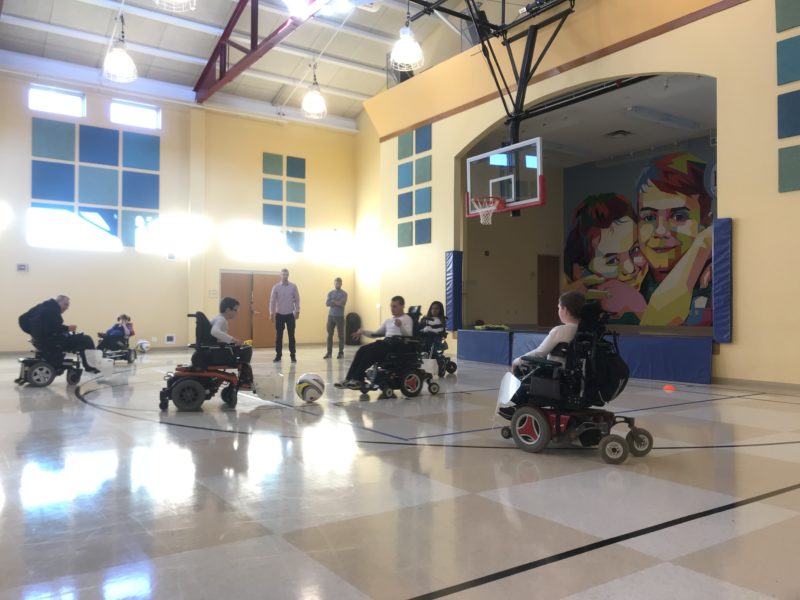
Over the next few years, they worked to solidify the rules and regulations of power soccer and eventually changed their name to the International Federation of Powerchair Football.
In our old Kentucky home
Back in Kentucky, Rudd has the players hit the ball around in a circle. The two in the modified chairs are clearly more experienced than the rest of the team in the way they handle the ball and pass it with confidence. The rest of the players laugh as they learn to maneuver their chairs to hit the ball. Rudd stands by with a smile.
This is the first gathering of KPS. Today, KPS is Kentucky’s first ever power soccer team, but it is just a clinic to get people involved who may have never heard of power soccer before. Rudd and her 15-year-old son, Cosmo, used to live in California where Cosmo played on a competitive power soccer team. When they moved to Louisville to be with their family, they found out that there was no team. They decided to form their own.
“[Power soccer] provides a sporting opportunity for people in power wheelchairs which doesn’t exist anywhere else,” Patricia Rudd said. “When we got [to Louisville], we knew there wasn’t a team, and we knew we needed to start one.”
The main reason Patricia Rudd wanted to form a team in Louisville was because of the benefits power soccer has provided her son.
“When you have a disability, it’s really easy to self-isolate: you stay home, you don’t do much, you don’t go places, your world gets smaller,” Patricia Rudd said. “All of the benefits that come from playing a group sport is now available to Cosmo, which [it] wasn’t before.”
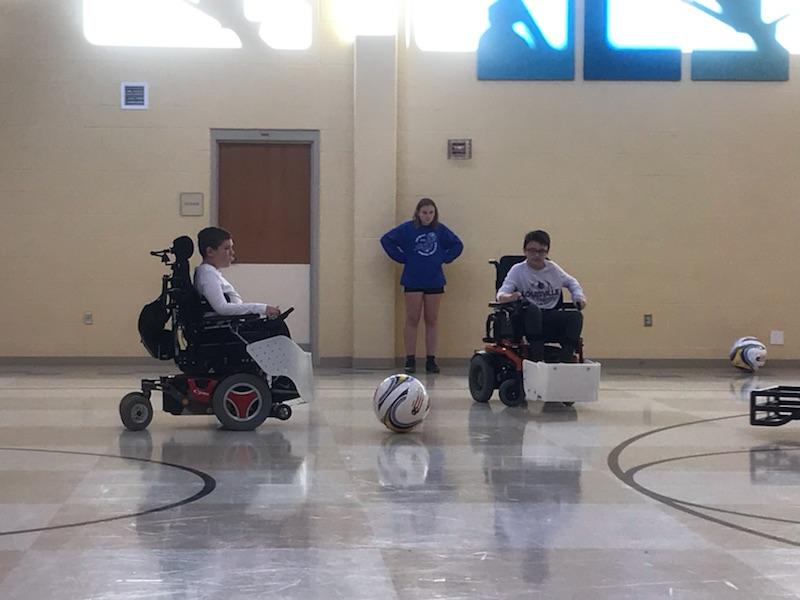
Patricia Rudd said that power soccer has taught Cosmo Rudd teamwork and given him role models.
“Cosmo has some friends who are in their 20s,” Patricia said. “They’re living with a similar disability that he has, and he can look to them, he can ask them questions, he can see ‘oh, this is what life can look like.’”
Cosmo Rudd reiterated that power soccer has helped him develop skills that he didn’t have before.
“[I’ve learned] a lot of teamwork in general and just working with other people,” Cosmo Rudd said.
KPS attracts players from different parts of Kentucky and Indiana.
Gabrielle Runyon (11, HSU) is a student at Manual who plays power soccer.
“It gets people involved in wheelchairs where you can’t move and it gets you involved in a sport that you can actually play,” Runyon said. “I’ve learned a lot of team work and how to communicate with other people.”
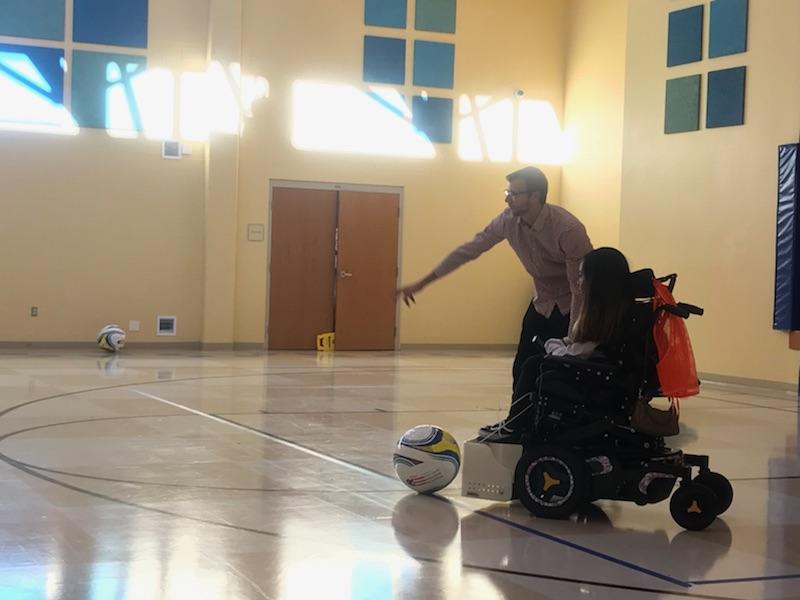
Power soccer gives people who have never had a chance to play sports the chance to join in on what every other kid has the opportunity to do.
“I just feel like it’s just a really great thing to include more people in sports,” Cosmo Rudd said. “[Power soccer] is so adaptive that anyone with any disability can play it.” Cosmo later described that players could drive their chairs using their breath or their eye movements.
Gail Smith, Patricia Rudd’s sister and the manager of the team, described how sports were a big part of her family so the idea that someone wouldn’t be able to join in upset her.
“I just couldn’t imagine a kid without that kind of opportunity,” Smith said. “The whole world of athletics or sports being another roadblock for [Cosmo] was just really frustrating. That’s why I feel so strongly about soccer.”
Power soccer’s benefits
Power soccer doesn’t only benefit the players in individual ways, it helps draw them together as a community.
“This [sport is] great [for Cosmo. He can] be around other people like him, make some friends,” Patricia Rudd said.
Other partnerships
KPS is currently working with the Paralyzed Veterans Association to be able to include veterans who can no longer play sports that they might have been able to play before.
“There’s always people in the community that want to come together, and we knew that people would want to play if we showed them that it was here and it was close and easy for them to get to,” Cosmo Rudd said.
Attempting to overcome adversity
The KPS team has six players so far and are still looking to attract more.
“If [someone] knows anyone in a powerchair, ages five and above, send them out,” Patricia Rudd said.
One reason that KPS is having a hard time attracting new players is the high price of equipment. The powerchairs designed specifically for power soccer are very expensive, so the sport can often be a pricey one to play. The chairs can cost as much as $20,000. Patricia Rudd talked about wanting to eliminate the fees for her players.
“My goal is to raise enough money so that the sport doesn’t cost our players and families anything, because it can be expensive,” Patricia Rudd said.
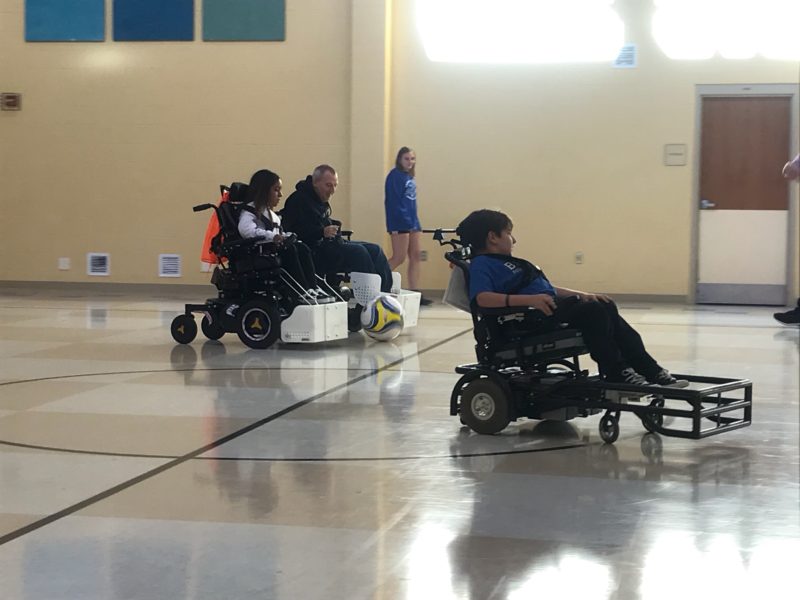
KPS accepts tax deductible donations which can be made out to the United States Power Soccer Association in the name of KPS. The organization also takes direct donations. They also are looking for volunteers to help with setup and refereeing.
“We’re gonna need referees,” Patricia Rudd said. “And once we start hosting games, I would like to have an announcer.”
The players are excited to begin competing as well. “I’m excited for our first game,” Runyon said.
Cosmo Rudd is ready but a little nervous to step up as a leader on the team.
“It’ll be fun to play on a team, although I feel like I’ll be nervous because I feel like I have to do a lot more,” Rudd Said. “I’ll have to lead a lot more than I have.”
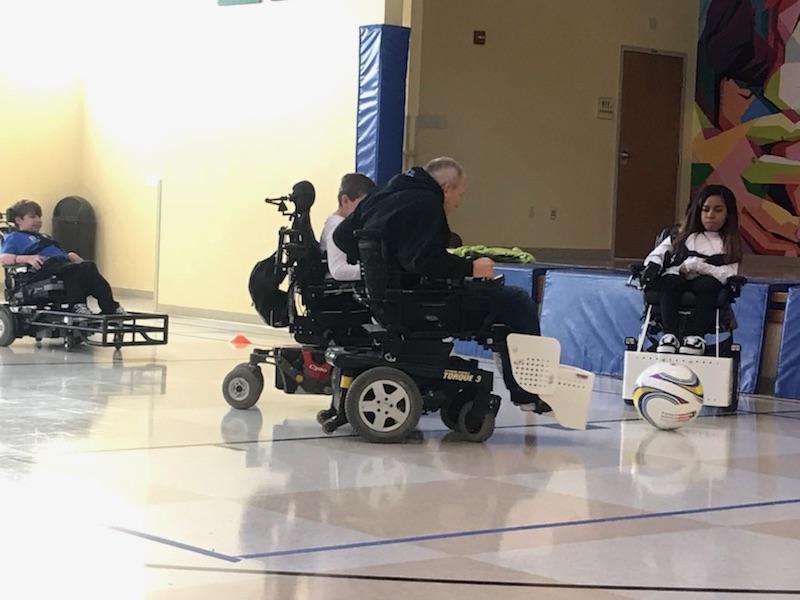
Power soccer is a sport that hasn’t had a lot of attention in past years. Patricia Rudd mentioned the lack of cheering that she noticed at the tournaments she visited. She said that the more people who come out to watch, the more special the experience is for the players who cannot play any other sports.
“I feel really proud. I’m proud of all of my family and what we’ve been able to accomplish and that we’re here,” Patricia Rudd said. “It’s really big.”









patricia Rudd • Dec 22, 2018 at 11:24 am
Thank you for a wonderful article. We are excited to bring the sport of power soccer to Louisville and are fortunate to have great volunteers and players.